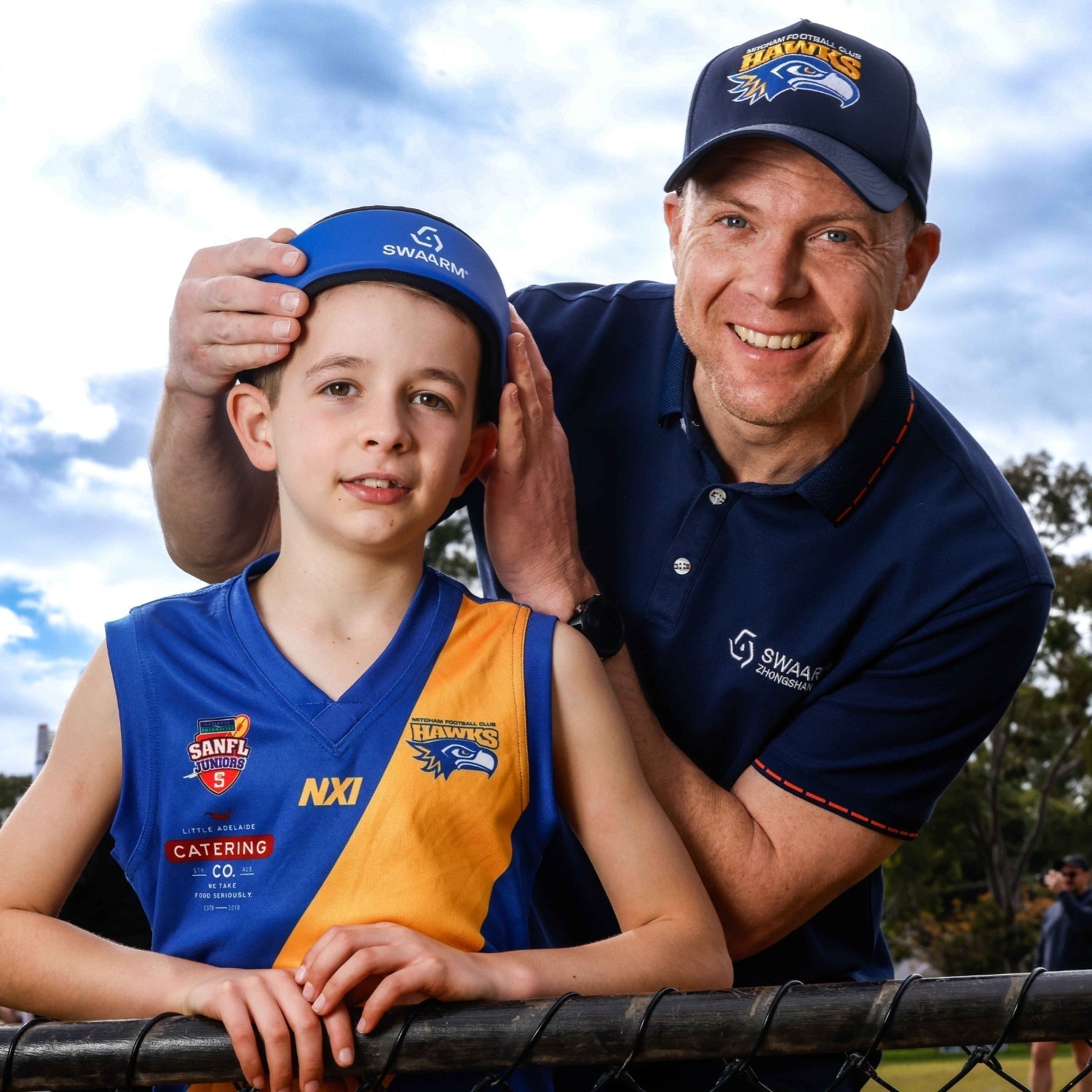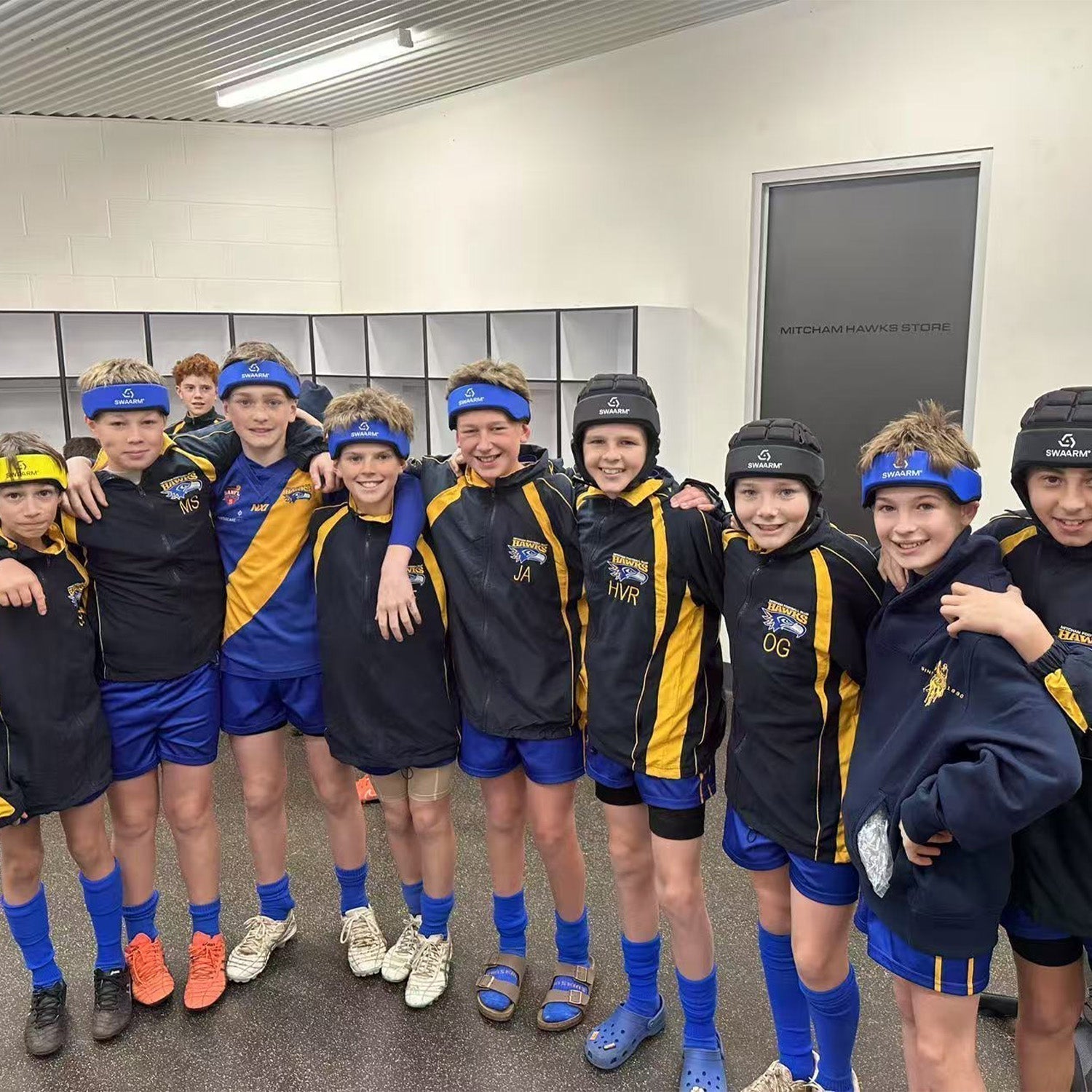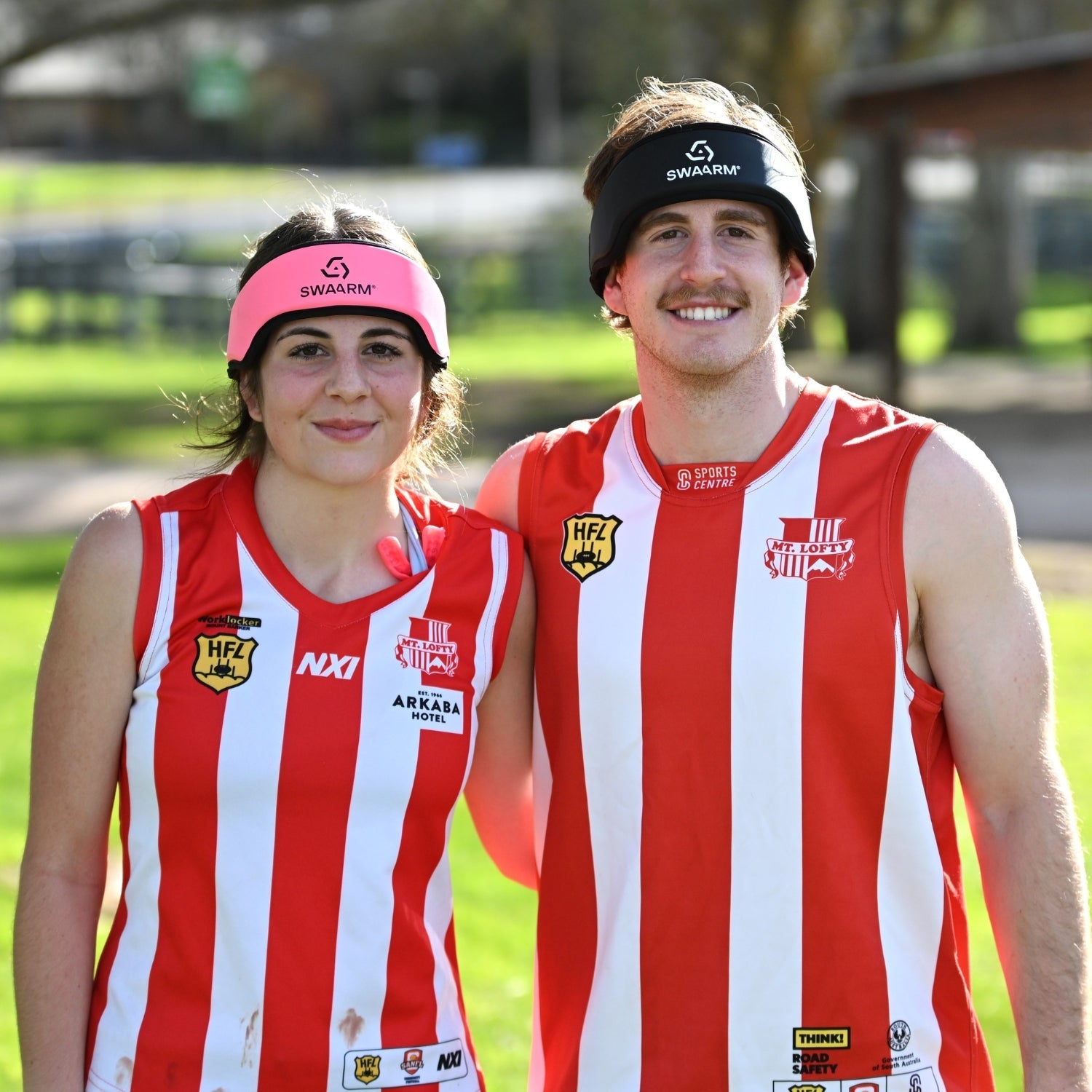Photo - Russell Millard
Written by Andrew Capel - The Advertiser
It was a sight for sore eyes. Watching more than 70 young Mitcham Hawks footballers don headgear for their under-age games on Sunday almost brought Luke Ivens to tears. “Concussion safety is a deep passion of mine and to see so many kids at Mitcham wearing headgear means everything to me,’’ the former star North Adelaide footballer said. “It’s very special, no doubt, because I want to end CTE (chronic traumatic encephalopathy). “Seeing the kids wear headgear that actually works and can make a difference in preventing concussions was a good moment, very humbling, because we need to protect the next generation’s health.’’
Ivens is speaking from experience. The 42-year-old was a standout SANFL player who tallied 194 league games for the Roosters from 2000 to 2013. But his post-football life has certainly been challenging.
The Yorke Peninsula product, who grew up in Maitland, suffered “up to 20’’ concussions during his career - one so bad that it saw him black out for seven minutes. Frighteningly, he had five concussions in one season alone, at age 21 in 2003, prompting him, after advice from a club doctor, to wear a helmet - “my armour’’, he said - for the rest of his career.
But the type of helmet Ivens wore - made of foam - was largely ineffective. “It didn’t really work and I continued to cop concussions,’’ he said. With little known about the long-term effects of concussions at the time, Ivens would often be “straight back out on the field a week later’’. But the repeated head knocks took their toll and would later “haunt’’ him. In 2019, while he was finishing his football career playing in the Hills for Uraidla, Ivens’ mental health deteriorated and he started becoming increasingly anxious, particularly in social settings.
Over the next three years, other symptoms crept in, including headaches, dizziness, nausea, short-term memory loss, impaired judgement and depression. Eventually, with prompting from his mum, he saw neurologists and was diagnosed with a significant brain injury as a result of having so many head knocks.
One neurologist likened the damage to a “car crash victim’’, while another said his brain looked like it had suffered as many as 50 concussions. He was diagnosed with “probable CTE’’ (a degenerative brain disease likely caused by repeated head injuries) and put on medication to stabilise his symptoms. His health improved, but Ivens - after feeling he had been to hell and back - didn’t want other footballers to suffer the same fate. He wanted to become a difference maker. “I wanted to become a story of hope, rather than despair,’’ he said. “I wanted to convey how passionate I am about supporting brain injury sufferers and their families and doing what I could to help people from suffering concussions in sport - and trying to prevent them where possible.’’
Ivens teamed up with the Concussion Legacy Foundation, speaking to community sporting clubs and schools about his experience. This year he partnered with SWAARM, a South Australian company that has made a breakthrough in headgear technology, to try to further spread the concussion message. Ivens said the company’s new, lightweight headgear - worn by North Melbourne AFL stars Tristan Xerri and Caleb Daniel - had been scientifically proven to reduce impact force by up to 93 percent and was spreading like wildfire among junior football teams in SA.
“We’re now seeing hundreds of junior players across Adelaide wearing these helmets, which brings me great satisfaction,’’ Ivens said. “This is a major advancement in technology. It’s pretty much like chalk and cheese to the helmet I wore. “It is estimated that upwards of 85 percent of concussions stem from hits to the ‘halo’ of the head and these helmets protect that area more, while decelerating the force of impact. “They are not a silver bullet in stopping concussions but they certainly reduce the risk’’
Ivens, the father of three young boys, aged two to 10, has been overwhelmed with support since speaking on the severity of concussions at Mitcham Football Club two months ago. The entire Mitcham under-10s team now wears helmets in games and at training, along with most players in grades up to under-13s. Ivens said parents and companies involved with the Adelaide Footy League club had provided financial support to pay for the helmets, “including Pickstar, FDC Construction and club legend “Swooper’’ McIntosh’’ as the preventative concussion message spread. He said Mitcham had not reported a sole concussion since its players had donned helmets and that he would love to see all players in South Australian junior teams up to under-16s wear helmets to protect their long-term health. “Because ages 10 to 16 is a crucial development time for brain health, and it’s when tackling is introduced,’’ Ivens said.
The AFL has become increasingly mindful of concussion-related issues in recent years, introducing recovery protocols and even medically retiring players who have ongoing problems. The protocols have trickled down to community level. Ivens said he still has “good and bad days’’ and knows he has a battle ahead of him. But he is driven to stop others from suffering the same fate and is glad his message is finally being heard loud and clear. “I get upset every time I see someone get concussed on a football ground, so I am doing what I can to try to prevent concussions and end CTE,’’ Ivens said. “We need to try to make the game as safe as possible and the advances in technology - and concussion awareness - are certainly helping with that.’’









Leave a comment
This site is protected by hCaptcha and the hCaptcha Privacy Policy and Terms of Service apply.